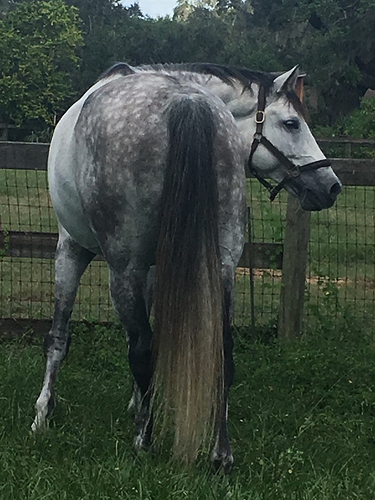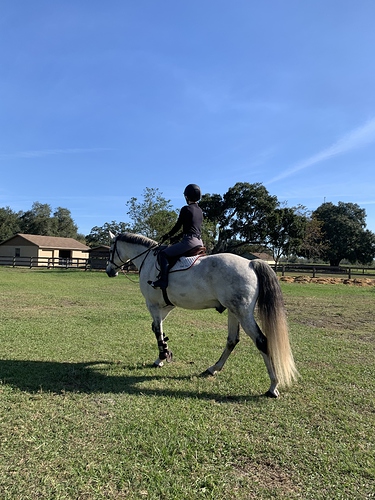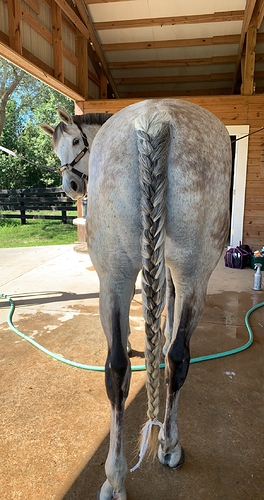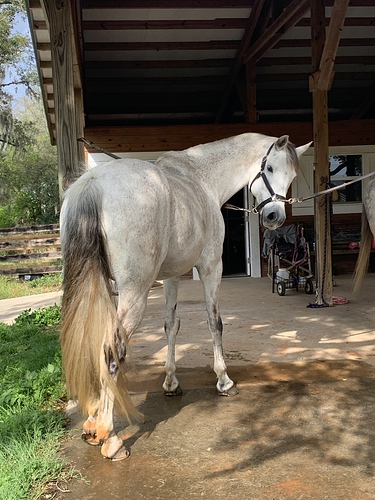Hope this fits in this section! Questions about the grey coat color progression. My 12 year old grey shed out his winter coat and seems to have nearly completely lost his dapples and gained a million flea bites. Do flea bites fade also with time? Are the flea bites their base color? He was grey when I bought him 6 years ago so I don’t know his foal color. His bites are very red/chestnut. Are flea bites indicative of heterozygosity for grey ?
For reference from before to now.
Thanks for any input. 
At this stage you can’t tell his color. Red/brown body spots can be chestnut or bay. It’s an easy hair test to find out his base color if you really want.
Zygosity doesn’t dictate fleabites, only a generalization that GG will gray faster.
Like JB already said, yes it’s his base coat but it’s really hard to tell the difference. Bay flea bites basically look the same as chestnut. Sometimes they are notably dark, but usually they are just reddish.
Flea bites don’t fade. They actually increase over time, though it varies horse to horse.
Thank you both. I thought he’d just turn very white. Then all these spots developed. I did not realize that flea bites do not fade! I’m going to have to rename him freckles. Any association with the greying process/ flea bites / GG vs Gg and melanoma development? So far he’s good.
I believe yes but I think there are other factors at play as well.
GGs are more likely to develop melanomas and sooner, but Gg is still almost “guaranteed” if they live long enough.
Has an old grey horse ever NOT developed melanoma?
I mean, I’m sure it’s possible, but it’s usually said all grey horses will develop melanomas if they live long enough.
Anecdotal observation, but melanomas seem more problematic today than they were 30+ years ago. I grew up on a farm with predominately Arabs and ponies— every third horse was grey. Apart from bumps under their tails, no one had problems, everything lived to ripe old ages. Yet the past 10-15 years I have known so many horses with complications from melanomas. I don’t know why. I often wonder if it’s because I see a more diverse sampling of grey horses or if additional genetic mutations have become widespread in the population or something in the environment is triggering more serious problems or what.
I have a Gg horse who took forEVER to grey out, but had a small melanoma at two and has several large ones now at 12. It can really be all over the map on speed to grey & melanoma production.
I know a 30 yr old flea bitten gray OTTB that has only developed a few small bumps under his tail.
I had a grey pony (white, not flea bitten) who never developed any melanomas to my knowledge. She died at 22 from laminitis… perhaps they would have developed later if she had lived longer.
Is there any way to prevent melanomas? I read that the sun doesn’t affect their development in horses like people.
Gray horse melanoma is from the graying process, so technically, Gray is a disease. The process progressively removes melanin from the hair, and concentrates it in the skin and elsewhere, which is the root cause of the melanomas, So no, it’s not the same cause as in people, and sunlight doesn’t make any impact.
This is interesting
“…relative likelihood of melanoma based on pregraying coat color is black > bay > chestnut.”
So a chestnut horse that had gone grey has less likelihood of developing melanoma than a black horse.
I wonder if there actual is an increase in melanoma in gray horses or if more horses are living longer and we are noticing more. Identifying more issues rather than calling it a generic ‘took sick’.
Entirely likely, as “they” say that if a gray horse lives long enough, he’ll get melanomas




